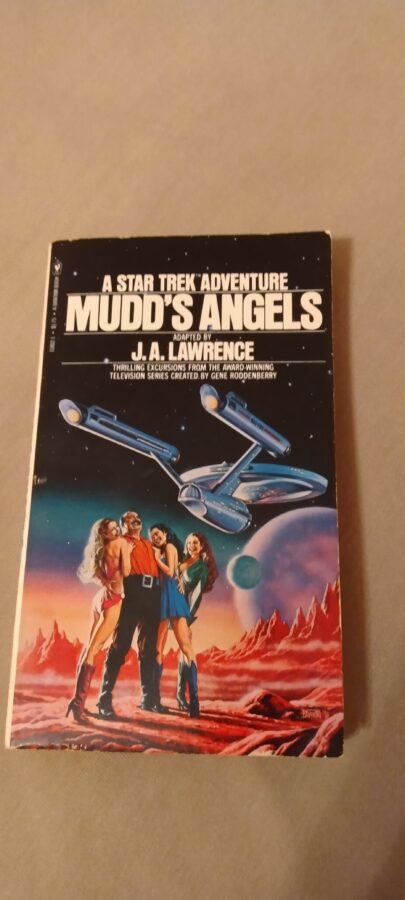
“I’m a doctor, not a T.V. tie-in writer.”—-anon.
Recently, I viewed the last, nearly-forgotten episode of the original “Star Trek,” from 1978. Sort of. At least, I consider it an episode. But first, some background is in order.
In the era before You Tube, streaming, DVDs or even VCR tapes there were precious few ways for rabid fans to relive their favorite T. V. shows or movies. For fans of Gene Roddenberry’s classic, the original “Star Trek,” one way was through a series of paperback novelizations featuring adaptions of the original episodes as short stories. These books, which were bestsellers, ran from “Star Trek One” to number twelve and were penned by the estimable science fiction writer and critic James Blish. And the author of such classics as the “Cities In Flight” series was amused by the knowledge that there were fans who knew him only through the Trek adaptions.
The books are interesting for those curious in the workings of script-to-screen production in that Blish was British and was working from early drafts of the scripts before he saw the actual finished episodes telecast in England and in some of them there are differences in the plot. For example, Blish’s adaption of “Who Mourns for Adonis?” features the original ending which the network vetoed.
Most of the original stories were adapted for the books. The notable exceptions were the two episodes featuring intergalactic swindler, thief, rogue and con artist Harry Mudd, the lovable charlatan who first appeared in the 1966 episode “Mudd’s Women,” and returned in “I, Mudd.” played with a combination of menace and buffoonery by the late actor Roger C. Carmel.
The original scripts and teleplay for the two Harry Mudd stories were written by Stephen Kandel and David Gerrold (who revised the teleplay for “I, Mudd,”) and were the last Trek adaptions Blish was working on before his death in 1975. They were finished by J. A. Lawrence and they hold up pretty well and appear in the 1978 Bantam Paperback “Mudd’s Angels.” (The book title and the cover, featuring an illustration of a laughing Mudd on an alien world with three scantily-clad women at his side may have been intended to cash in on the then-current hit TV. series “Charlie’s Angels.” A bit of misdirection Harry Mudd would probably have approved of!)
Filling out the book is an original story by Lawrence involving a new Mudd escapade which would have made a fun episode. “The Business as Usual, During Altercations” takes place during the run of the original series and is a nostalgic look back, even more so forty-five years after the book’s release, almost sixty years after the Mudd episodes first ran.
The novelette features another of Mudd’s swindles (or IS it a swindle?) where he is his usual, charming, sleazy self and manages to suddenly have literally everyone over a barrel. Characterizations are perfect, from Mudd, the series major trio of Kirk, Spock and McCoy and the supporting players on the Enterprise. Uhura, Scotty and Chekov each get a moment to shine. Chekov in particular has some very funny moments in the story which actor Walter Koenig might have enjoyed playing. And the story involves a chase scene and some special effects that might have been beyond 1960s television. And there’s a trip to the Small Magellanic Cloud, and I don’t know that I’ve seen any science-fiction stories use that as a setting.
And there are plenty of laughs and thrills in this entertaining novelette.
There are a few oddities in the story which was written in the last half of the 1970s. The 23rd Century computer search engines are apparently slower than Google, and the story somehow foreshadows events from later incarnations of Trek, including Next Generation and Voyager. The story, by the way, was one of the earlier fictional published versions of Star Trek, in a time when there were only the Blish adaptions and a handful of original works, including one novel by Blish: “Spock Must Die!” on the bookstore shelves for eager Trek fans.
Writer J. A. (Judith Ann) Lawrence, by the way, was Mrs. James Blish, an artist and a fine writer of science fiction stories in her own right, and as of 2024 she is still around.
So, how does this fit into the “Queer” part of a “Queer SciFi” column? For openers, actor Roger C. Carmel was gay although extremely closeted. He appeared in movies, commercials and the sitcom “The-Mothers-In-Law” but his career suffered in later years, not because of his sexual orientation but because of his drug use which may have contributed to his early death at the age of 54 in 1986. His Chicago Tribune obituary was lengthy and started with his “Star Trek” role.
Even in the closeted era of the ‘60s and ‘70s, gays were active and even prominent behind the scenes in television and movies. Erika Scheimer, herself out and the daughter of “Star Trek; the Animated Series” producer Lou Scheimer (where Carmel reprised his Mudd role in voice-over form) said that there were Gays working openly on the animated series as they were all over Hollywood.
A book has power. For a few hours, it’s possible through its pages to travel back to the second decade of the Final Frontier.
“Mudd’s Angels” is dedicated “To the Memory of James Blish.”
Here’s a link to the You Tube interview with Erika Scheimer. https://www.youtube.com/watch?v=93dGmqjMK-U
Jeff Baker’s fiction and non-fiction have appeared in the online ‘zine “RoMMantic Reads” https://rommanticreads.wordpress.com/ among other places, and he has a story in the latest QSF anthology “Rise.” He blogs about reading and writing sci-fi, fantasy and horror around the thirteenth of each month in this same space. He may have an old “Star Trek” Photonovel somewhere. Jeff regularly posts fiction on his blog https://authorjeffbaker.com/ and wastes time on Facebook at https://www.facebook.com/profile.php?id=679510827 and Mastodon (as “Mike Mayak”) https://mastodon.otherworldsink.com/@MikeMayak


